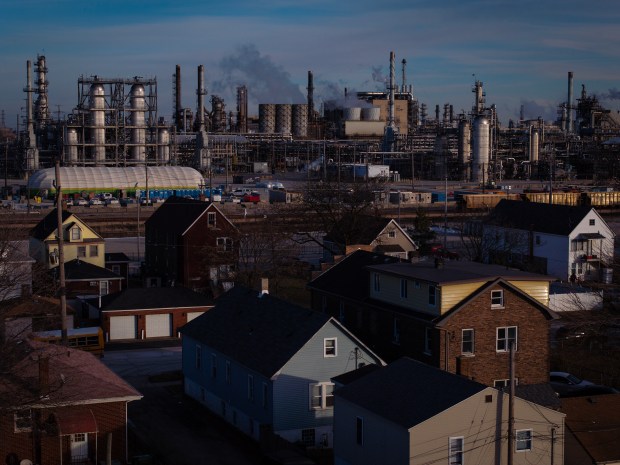As a Whiting resident, Lisa Vallee is happy to no longer worry about BP’s proposed carbon sequestration project.
“It seems, on the surface, like it’s such a great idea,” said Vallee, who is also the organizing director for Just Transition Northwest Indiana. “But it’s been proven globally that these projects don’t actually reduce carbon emissions, and then they’re much more dangerous than they are worth.”
BP has indefinitely paused its carbon sequestration project, which would have required a pipeline to run through hundreds of miles in six Indiana counties to store carbon emissions underground.
“BP is committed to remaining a critical driver of the economic engine that powers Northwest Indiana and the Midwest,” a company spokesperson said in a statement. “While we are indefinitely pausing our low-carbon project in the region, our focus is on building a strong, economically competitive future for our Whiting Refinery.”
The company said “many factors” went into the decision, including uncertainty created by current economic conditions; focus on the company’s core businesses; a slow-developing hydrogen market in the Midwest; lack of an identified carbon storage facility; and lack of certainty for long-term federal support for low carbon hydrogen.
The decision only relates to BP’s involvement in the Midwest Alliance for Clean Hydrogen hub and no other low-carbon project the company might develop nationally or globally, according to the spokesperson.
U.S. Rep. Frank Mrvan, D-Highland, said in a statement that “it’s not lost” on him that the company made the decision during House passage of legislation that would end the clean hydrogen production tax credit.
The decision makes it clear that the Trump Administration’s actions cause a “real and devastating impact” on workers and manufacturing nationwide, Mrvan said.
“I will continue to actively seek opportunities to collaborate in a bipartisan manner, with all levels of government, and with organized labor and all stakeholders to reverse this trend and create new opportunities for transformational economic growth, work, and wealth in Northwest Indiana,” Mrvan said.
The Biden Administration allocated up to $1 billion in funding for the planned hub, but shifting priorities have led the Department of Energy to reevaluate the awards for the Midwest hub and three others in the Pacific Northwest, California and the Mid-Atlantic, according to Reuters.
Just Transition Northwest Indiana learned the project was paused following a statement from the Benton County Board of Commissioners. Benton County was one of the Indiana counties that would’ve been affected by the project.
“We have been advised that in February BP indefinitely suspended all carbon sequestration and hydrogen gas exploration,” said the letter from Benton County commissioners. “They’re focusing back on their roots of oil exploration. They felt this is not the time or place with the feedback they received from Benton County.”
Vallee was surprised to learn about the project’s pause from Benton County and not BP.
Just Transition Northwest Indiana members knew there was a possibility that it would be paused because tax credits might be taken away by the federal government, Vallee said.
“This pipeline was supposed to be part of the Midwest Alliance for Clean Hydrogen hub, and that has not gone away, at least yet,” Vallee said. “So, we are accepting this victory and very excited, but also aware that there are a lot of other sneaky false solutions that are probably right around the corner.”
Gary Advocates for Responsible Development was relieved to see BP put the pipeline project on pause, board member Carolyn McCrady said in a statement Thursday.
“However, pause does not mean gone, and we will remain vigilant about any future attempts to reinstate a pipeline,” McCrady said. “And (we) will continue to insist that they initiate advanced and available technologies to reduce their heavily polluting tar sands emissions.”





